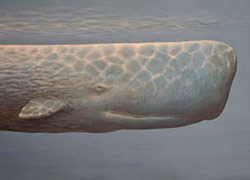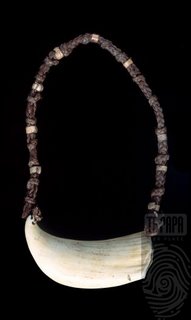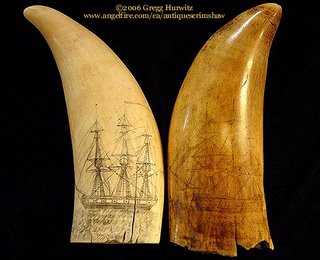
From Wendy
In the light of this week’s voting on whaling with representatives from South Pacific small countries, I decided to post some comments about whaling and whales’ teeth in reference to Fiji. There are always two or three whales’ teeth in our household, one always hanging on the wall over a piece of Fijian barkcloth. They keep moving on though when there is a need for a ceremony. Also, we have a large photograph on our lounge room wall of a whale leaping, next to photograph of Michael Jordan also leaping!

The following notes are from cutting and pasting after a Google search.
The tabua
In Pacific Island society, some objects can have a 'spiritual' value that far outweighs their actual 'market' value. The tabua plays a similar role in Fijian society. Tabua are pierced and braided whales’ teeth, originally taken from the lower jaw of sperm whales found stranded on Fijian beaches. As whale strandings were relatively rare, so were whales' teeth more valued as a result.
Tabua are considered by Fijians as a 'chiefly thing'. Ceremonial tabua have holes drilled through the tip and the butt, and a braided sennit cord is attached. The teeth are polished and sometimes rubbed with coconut oil and turmeric to darken them.

While the tabua is a uniquely Fijian object, whales’ teeth are used in other societies. European sailors used to carve and colour whales' teeth in their spare time - this was called scrimshaw. They were also shaped into necklaces and other ornaments in many parts of the Pacific, including Samoa, Tonga, Tahiti, Hawai'i and the Marquesas Islands. Māori also used whales' teeth to make rei niho (whale tooth pendants) which were worn by people of high rank. However, nowhere else in the Pacific do whale teeth have the power or meaning of tabua in Fiji.
History of the tabua
Before the Europeans came to the South Pacific, the people of Fiji used a wooden token for various ceremonial purposes. Called the bua-ta, the token was a highly polished piece of wood carved from the bua tree. But, about one hundred fifty years ago, western whalers began to call at Fiji, offering whales' teeth in exchange for sandalwood and other resources. The natives were struck by the similarities between the whales' teeth and their ancient bua-ta and soon adopted them instead, naming them a tabua.
It is believed that the whale’s tooth, as an object of value, was first introduced to Fiji from Tonga at the end of the 18th century. However, long before the whale’s tooth, Fijians placed special value on other objects - such as rare shells for important presentations. Depending on the significance of the event, several hundred shells would sometimes change hands.
The tabua is an honorary bestowal, presented as a traditional welcome to important guests, when making a special request, to seal a betrothal, as a token of mourning and to solve disputes. Each presentation ceremony follows a rigid set of rules for occasions such as birth, marriage, death, the launching of a canoe, the welcoming of visitors, the installation of a new chief. It is also used as an exchange of apology after a disagreement. In modern Fiji, the tabua holds an indispensable place in the social and economic life of the Fijian people that far outweighs its intrinsic value.
Whalers in Rotuma - from "Voyage in the South Seas," etc., Captain Peter Dillon, 1829, vol. ii, p. 95.
(Rotuma) became a favourite resort for American whalers in the South Pacific, as many as nine being remembered at anchor at one time at Oinafa. From these were naturally many deserters, who came to live on the island. At first they were received with open arms by the natives and supplied with food, but in time their numbers became ~o great, and their behaviour was so bad, that they were left severely alone; from first to last it never went so far as to allow them to starve. Their number at one time cannot have been far short of 100, but fortunately they acquired no lands and few wives, so that they have, comparatively speaking, left little traces. Their children invariably remained on the island with their mothers, and were brought up just in the same way as a Rotuman child would be. It is recorded, to show their mode of life, that one beachcomber started from his house to make a circuit of the island. Of course he bad to stop and get drunk with each white man on his way, so that he was over three months (in getting home again.)
-------
International politics and whaling
I don’t think whalers would get a welcome in Fiji these days, but I wonder how many South Pacific small nations have voted with Japan at St Kitts this week in favour of whaling? On the Inernational Whaling Commission website the following are listed: Kiribati, Nauru, Solomon Islands, Tuvalu, but not Fiji. I heard that the Solomon islands delegate absteined from one or more of the votes.

11 comments:
Intersting post. Thanks.
Lahaina, Maui was also a popular anchorage for whaling ships in the 19th century, though Hawaiian culture never had the kind of relationship to whale's teeth as the Fijians. Due do doubt to the fact that the whales that visit Hawaii - humpbacks - are baleen whales and have no teeth.
Japan is one of the major sea plundering states (there are many now days including the US, China, Norway, and Taiwan) but particularly when it comes to whales.
They long for the day when they can kill whales commercially rather than just for "research" and have been using money to buy votes on the International Whaling Commission. They get small countries to join the IWC by offering aid to them.
Happily they have not won enough votes as yet, but they will not stop.
Ironically, whale meat is hundreds of times more toxic than even tuna. Much of it ends up as pet food and recently pet owners in Japan have rejected it over safety concerns. I hope that demand for it will dwindle to nothing and put a stop to the slaughter, but that is only part of the story.
The real reason Japan wants to hunt whales is to deplete them as competitors for the fish that Japan would like to exploit even further.
Mankind is straining all the resources of the planet now. Hopefully we can act responisbly to save it.
I believe it will be island nations, like Fiji, who value and depend on the sea, that will lead the way.
Check out Long Pig.
Panda,
I heard that Japan won the vote in one of the counts, so the 'buddy' countries must have decided to say thank you for the gifts of aid, etc.
I've found a book today - in the garage - which is about the history of European invasion into the Pacific so I will write up something about whaling which apparently was pre 1840. Mainly based in Tahiti, Hawaii, New Zealand and Tasmania.
Laminar,
I looked up the book but the only sites are to sell this book - printed about 1958. Certainly the people on the cover don't look very Fijian! I'll see if I can track it down at Deakin Uni library or somewhere.
There's a lovely little book - fictional about a tabua's adventures - moving from one person to another. I read it years ago.
W.
Got another book for that somewhat mirrors your life.
This involve a U.S citizn who marries a someone from Tikina Galoa.
Does anyone know of where you can buy a whales tooth in Australia?
what is so important about the whale tooth
Just as gold is used as an object of wealth in western society, the whale's tooth in Fiji society is an object that is used in ceremonies as a gift of value. Gold really isn't worth anything. A whale's tooth is hardly worth anything except to a live whale! But society has decreed that gold and whales teeth have a value.
Google the topic anyway.
And who are you, 'Anon i mouse'?
w.
Oh my! Whale teeth for a necklace? That's pretty weird! It will be like wearing a heavy pendant or necklace on your neck…hehehe
Claire N Lil- do you still want to buy a whale tooth? What is your budget?
hi...
im a different Claire than the other one....
just wondering if anyone knows where to buy a whale tooth in england?
thanks!
Dude I just bought one here in Brasil from a hippie that got it from a beached whale
It has such a great vibe and surrounded by the love Chief tribal spirits
I feel great w it already
I have lots of teeth necklaces I get from these guys out here
The boar one is against witchcraft
The alligator one too and luck in games
The jaguar one accompanies a jag spirit animal
The horse one is tribal and against evil eye and envy
When I see one I buy it no questions asked and just thanksgivings
Post a Comment